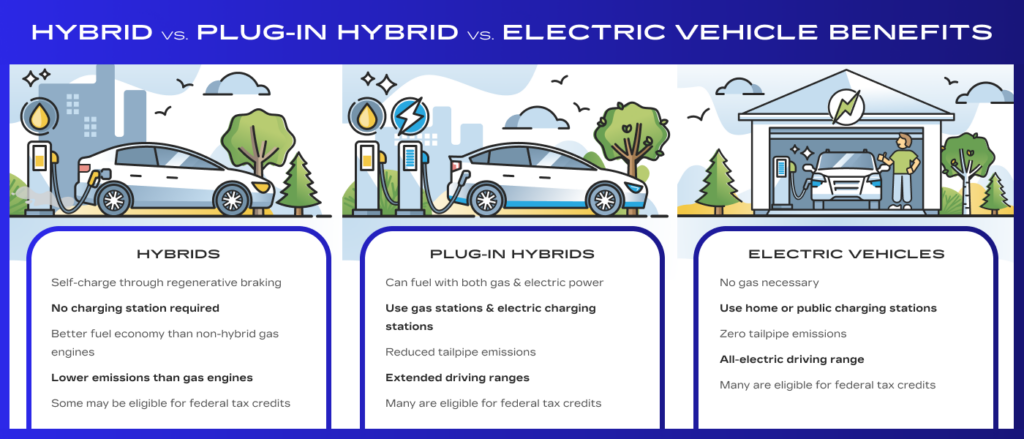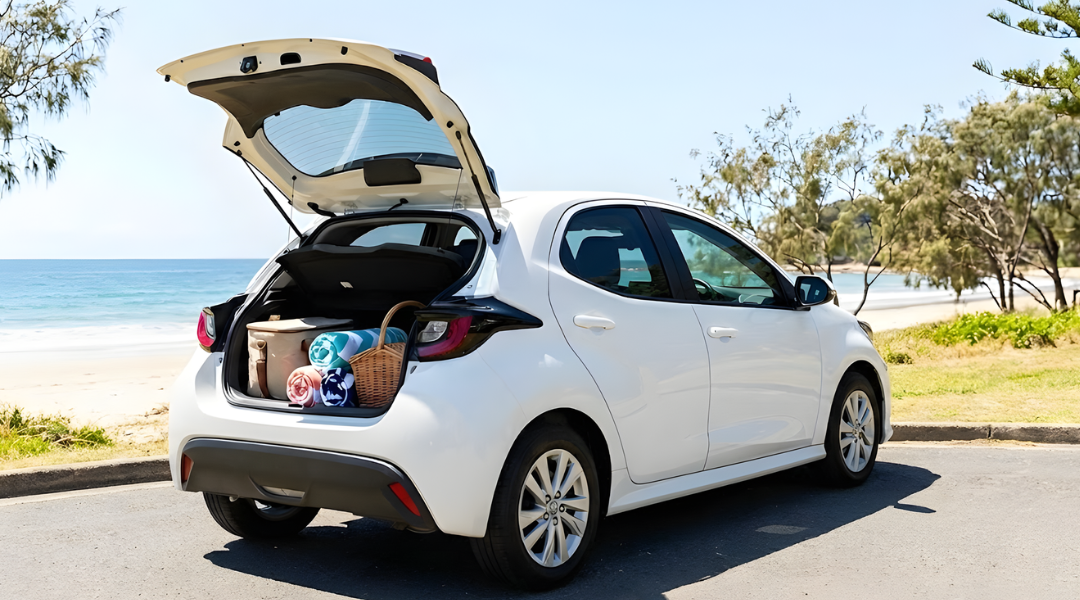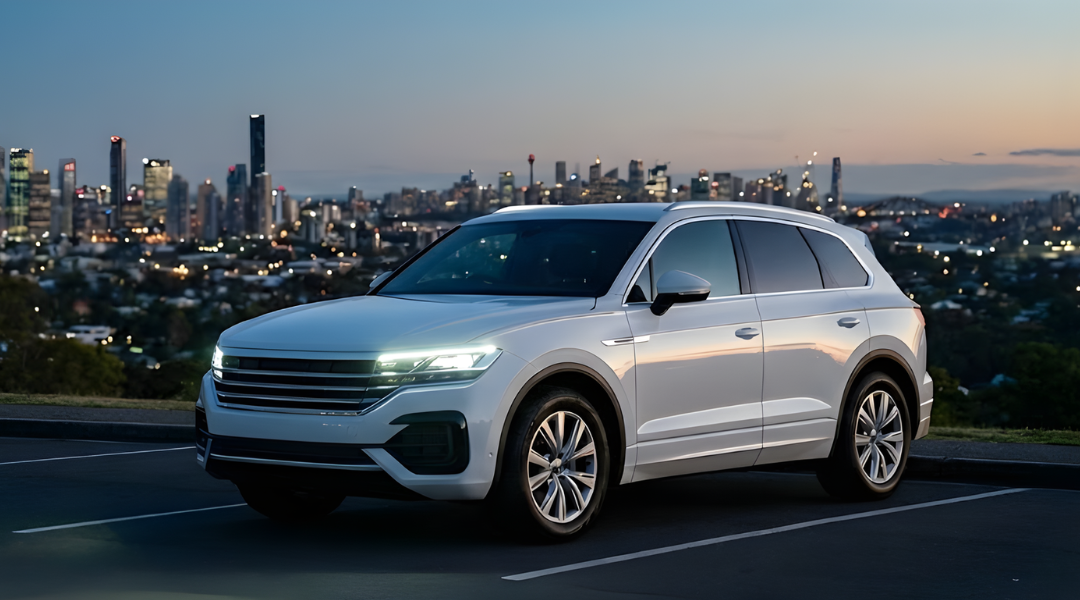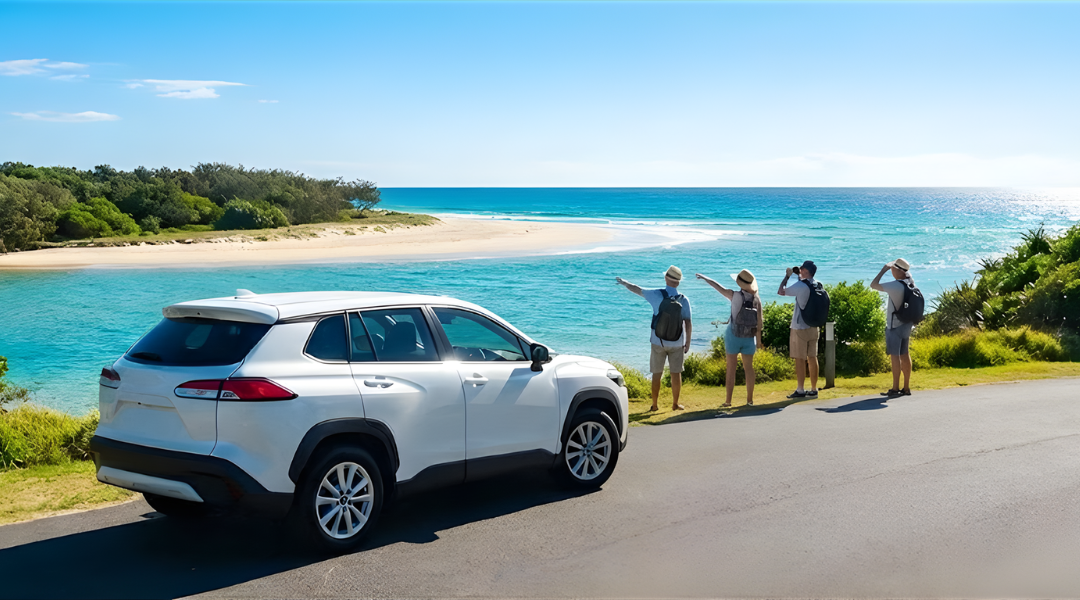The future of driving is electric, but is a hybrid the right fit for you? Let’s weigh the pros and cons.
The world is changing, and so is the way we power our vehicles. With growing concerns about climate change and air pollution, there’s a strong push towards sustainable transportation. Electric and hybrid cars have emerged as popular options, promising cleaner, more efficient driving. But which one is right for you? This guide will break down the key differences between hybrid and electric vehicles, helping you make an informed decision based on your lifestyle and priorities.
Understanding Hybrid Vehicles
Hybrid vehicles represent a bridge between traditional gasoline-powered cars and fully electric ones. They combine the best of both worlds by utilizing both a gasoline engine and an electric motor.
How Hybrids Work
A hybrid car’s powertrain consists of a gasoline engine and an electric motor, working together to propel the vehicle. The electric motor is powered by a battery pack, which is typically charged by the engine itself through regenerative braking (capturing energy from deceleration).
Types of Hybrids
There are three main types of hybrid vehicles:
- Mild Hybrids: These vehicles use an electric motor primarily to assist the gasoline engine, improving fuel efficiency but offering limited electric-only driving.
- Full Hybrids: Also known as self-charging hybrids, these vehicles can operate on electric power alone for short distances, but they primarily rely on the gasoline engine.
- Plug-in Hybrids (PHEVs): These hybrids have a larger battery pack that can be plugged in to charge. They offer an extended electric-only range, making them a good option for those who frequently drive short distances.
Benefits of Hybrids
Hybrid vehicles offer several advantages:
- Improved Fuel Efficiency: By combining gasoline and electric power, hybrids deliver better fuel economy compared to traditional gasoline cars.
- Reduced Emissions: Hybrids produce fewer greenhouse gas emissions than their gasoline counterparts, contributing to cleaner air.
- Silent Driving: Electric motors provide a quiet and smooth driving experience.
- Lower Maintenance Costs: Hybrid vehicles typically require less maintenance compared to traditional gasoline cars due to fewer moving parts in the engine.
The Electric Vehicle Revolution
Electric vehicles (EVs) are rapidly gaining popularity as a cleaner, more efficient alternative to traditional gasoline-powered cars. Let’s delve into how they work and compare them to hybrid vehicles.
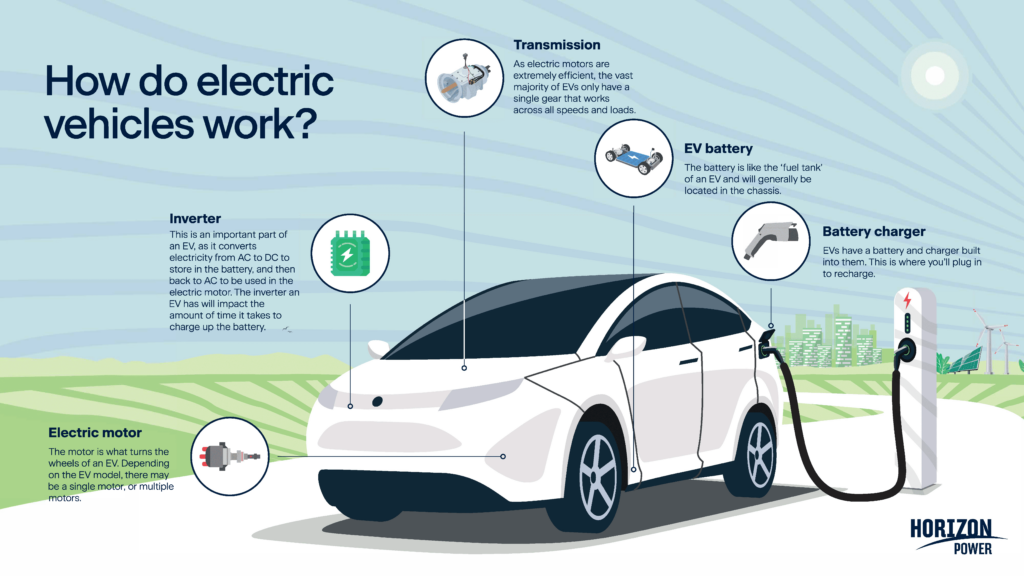
How Electric Vehicles Work
Electric vehicles run on electricity stored in a high-voltage battery pack. This battery powers an electric motor, which propels the car. Unlike gasoline engines, EVs have no tailpipe emissions, making them significantly cleaner.
Charging Infrastructure
While EV charging infrastructure is expanding rapidly, it’s still a factor to consider. There are two primary charging methods:
- Level 1 Charging: This uses a standard household outlet and is suitable for overnight charging. It’s slow but convenient.
- Level 2 Charging: This requires a dedicated charging station and provides faster charging times. Public charging stations are becoming increasingly common.
Range anxiety, the fear of running out of battery, is a common concern. However, EV ranges are steadily improving, and charging infrastructure is expanding.
Benefits of Electric Vehicles
- Environmental Impact: EVs produce zero tailpipe emissions, contributing to cleaner air and mitigating climate change.
- Cost Savings: Electricity is generally cheaper than gasoline, leading to lower fuel costs. Additionally, EVs often require less maintenance.
- Performance: Electric motors provide instant torque, resulting in impressive acceleration and handling.
- Government Incentives: Many governments offer tax credits and rebates for purchasing electric vehicles.
Hybrid vs. Electric: A Head-to-Head Comparison
Purchase Price
- Hybrids: Generally less expensive upfront than electric vehicles.
- Electric Vehicles: Tend to have higher initial costs due to battery technology.
Running Costs
- Hybrids: Offer better fuel economy than traditional gasoline cars but generally have higher overall running costs compared to EVs.
- Electric Vehicles: Significantly lower fuel costs and often require less maintenance.
Environmental Impact
- Hybrids: Reduce emissions compared to traditional gasoline cars but still produce tailpipe emissions.
- Electric Vehicles: Produce zero tailpipe emissions.
Driving Range and Charging
- Hybrids: Can travel longer distances without recharging due to the gasoline engine.
- Electric Vehicles: These have limitations on the driving range, but this is improving with battery technology. Charging infrastructure is expanding, but it may not be as convenient as refuelling a gasoline car in all areas.
Choosing the Right Vehicle for You
Deciding between a hybrid and an electric vehicle is a big decision, and it’s important to consider your circumstances. Let’s break down the key factors to help you make an informed choice.
Consider Your Lifestyle
Australia’s unique geography and driving conditions influence vehicle choice.
- Daily Commute: If you primarily drive short distances in urban areas, an electric vehicle might be a good fit. For longer commutes or frequent regional travel, a hybrid could be more practical.
- Driving Habits: Consider your driving style. Do you often carry heavy loads or tow caravans? Hybrids might be more suitable for these tasks.
- Charging Infrastructure: Assess the availability of charging stations in your area, especially if you don’t have home charging options. While Australia’s charging network is growing, it’s still essential to check availability in your region.
Take Advantage of Australian Government Incentives
The Australian government offers incentives to encourage the adoption of electric vehicles.
- Research Federal Incentives: Explore the federal government’s electric car discount and other potential benefits.
- Check State and Territory Incentives: Some states and territories offer additional rebates or stamp duty concessions for electric vehicles.
Note: Incentive schemes can change, so it’s essential to check the latest information from government websites.
Test Drive Both Hybrids and Electric Vehicles
Experiencing the vehicles firsthand is crucial.
- Focus on Range and Charging: Pay attention to the electric vehicle’s range and charging times.
- Compare Performance: Assess the acceleration, handling, and overall driving experience of both hybrid and electric models.
- Consider Comfort: Evaluate interior space, ride quality, and noise levels to determine which vehicle suits your preferences.
Remember: The best vehicle for you depends on your specific needs and circumstances. By carefully considering your lifestyle, budget, and the Australian environment, you can make an informed decision.
Conclusion
Hybrid and electric vehicles offer distinct advantages. Hybrids combine gasoline and electric power for improved fuel efficiency and reduced emissions. Electric vehicles are entirely battery-powered, delivering zero tailpipe emissions and often better performance. The best choice for you depends on factors such as your driving habits, access to charging infrastructure, and budget.
Ultimately, the decision between a hybrid and an electric vehicle is a personal one. By carefully considering your lifestyle and priorities, you can select the vehicle that best suits your needs and contributes to a more sustainable future.
Ready to experience the benefits of hybrid driving? Book your hybrid car rental now and enjoy a greener, more efficient driving experience.
[vc_row][vc_column][vc_empty_space height=”24px”][/vc_column][/vc_row][vc_row][vc_column][vc_custom_heading text=”Car Hire Locations” font_container=”tag:h2|text_align:center” link=”url:https%3A%2F%2Falphacarhire.com.au%2Fcar-rental-locations%2F|||”][/vc_column][/vc_row][vc_row][vc_column width=”1/5″][vc_column_text]
[/vc_column_text][vc_column_text]
[/vc_column_text][/vc_column][vc_column width=”1/5″][vc_column_text]
[/vc_column_text][vc_column_text]
[/vc_column_text][/vc_column][vc_column width=”1/5″][vc_column_text]
Sunshine Coast Airport Car Hire
[/vc_column_text][vc_column_text]
[/vc_column_text][/vc_column][vc_column width=”1/5″][vc_column_text]
[/vc_column_text][vc_column_text]
[/vc_column_text][/vc_column][vc_column width=”1/5″][vc_column_text]
[/vc_column_text][vc_column_text]
[/vc_column_text][/vc_column][/vc_row]
[vc_row][vc_column][vc_empty_space height=”16px”][/vc_column][/vc_row][vc_row][vc_column][vc_btn title=”Book Now” style=”custom” custom_text=”#666666″ shape=”square” align=”center” link=”url:https%3A%2F%2Falphacarhire.com.au%2F|title:Home%20Page||” el_class=”primary-btn”][/vc_column][/vc_row][vc_row][vc_column][vc_empty_space height=”16px”][/vc_column][/vc_row][vc_row][vc_column][vc_column_text]
[/vc_column_text][/vc_column][/vc_row][vc_row][vc_column][vc_empty_space height=”24px”][/vc_column][/vc_row][vc_row][vc_column][vc_custom_heading text=”Commercial Car Hire Locations” font_container=”tag:h2|text_align:center” link=”url:https%3A%2F%2Falphacarhire.com.au%2Fcar-rental-locations%2F|||”][/vc_column][/vc_row][vc_row][vc_column width=”1/5″][vc_column_text]
[/vc_column_text][vc_column_text]
[/vc_column_text][/vc_column][vc_column width=”1/5″][vc_column_text]
[/vc_column_text][vc_column_text]
[/vc_column_text][/vc_column][vc_column width=”1/5″][vc_column_text]
[/vc_column_text][vc_column_text]
[/vc_column_text][/vc_column][vc_column width=”1/5″][vc_column_text]
[/vc_column_text][vc_column_text]
[/vc_column_text][/vc_column][vc_column width=”1/5″][vc_column_text]
[/vc_column_text][vc_column_text]
[/vc_column_text][/vc_column][vc_column width=”1/5″][vc_column_text]
[vc_row][vc_column][vc_empty_space height=”16px”][/vc_column][/vc_row][vc_row][vc_column][vc_btn title=”Book Now” style=”custom” custom_text=”#666666″ shape=”square” align=”center” link=”url:https%3A%2F%2Falphacarhire.com.au%2F|title:Home%20Page||” el_class=”primary-btn”][/vc_column][/vc_row][vc_row][vc_column][vc_empty_space height=”16px”][/vc_column][/vc_row][vc_row][vc_column][vc_column_text]
[/vc_column_text][/vc_column][/vc_row]



